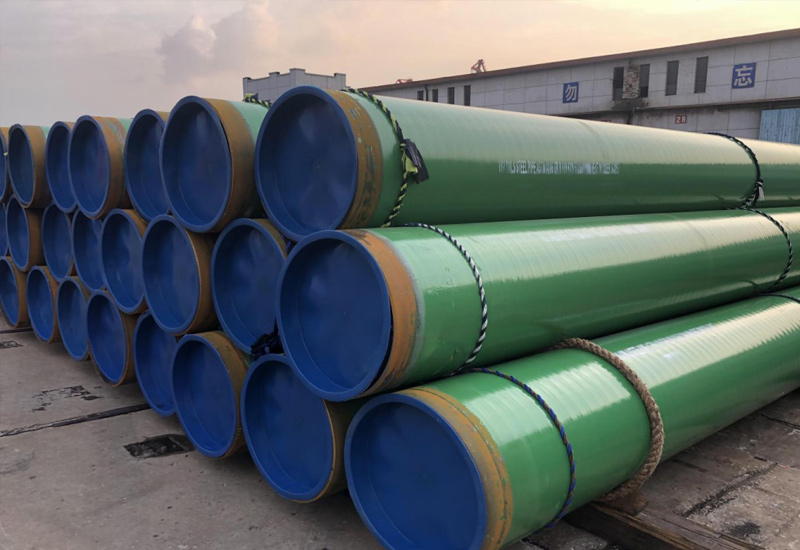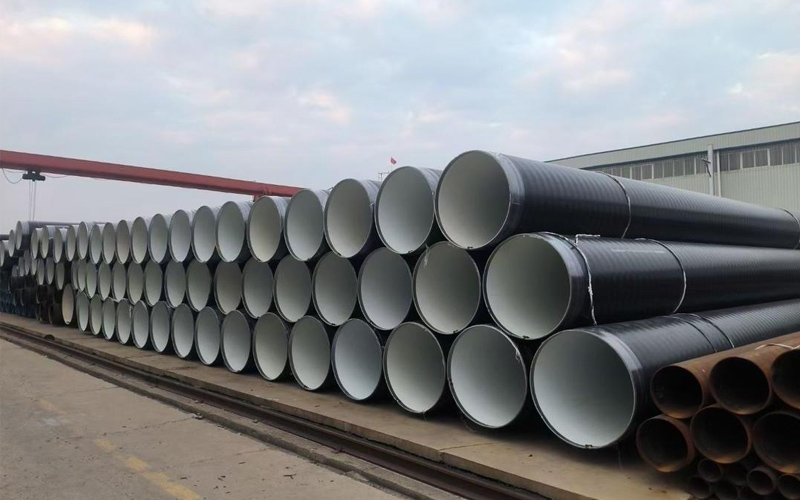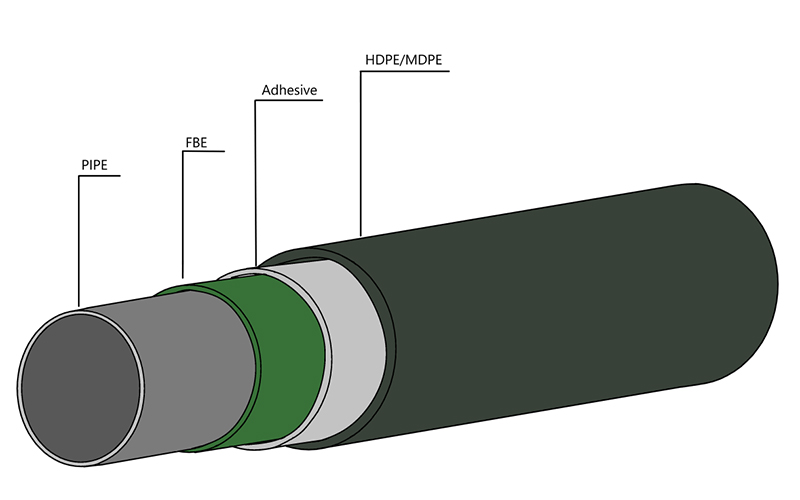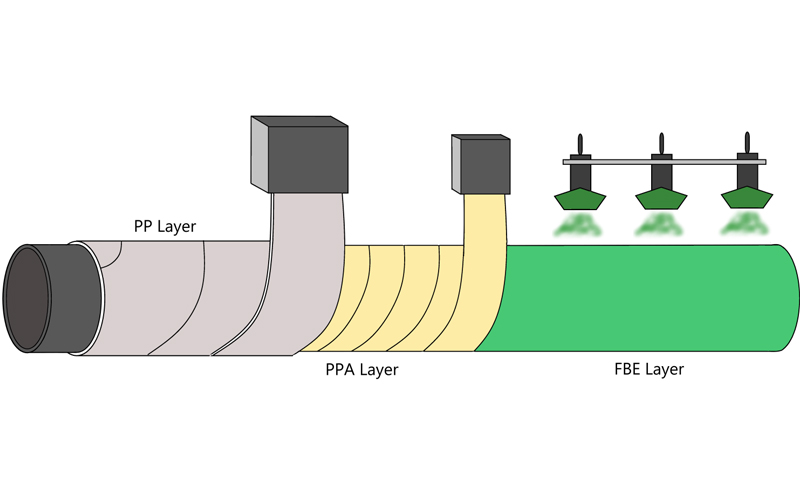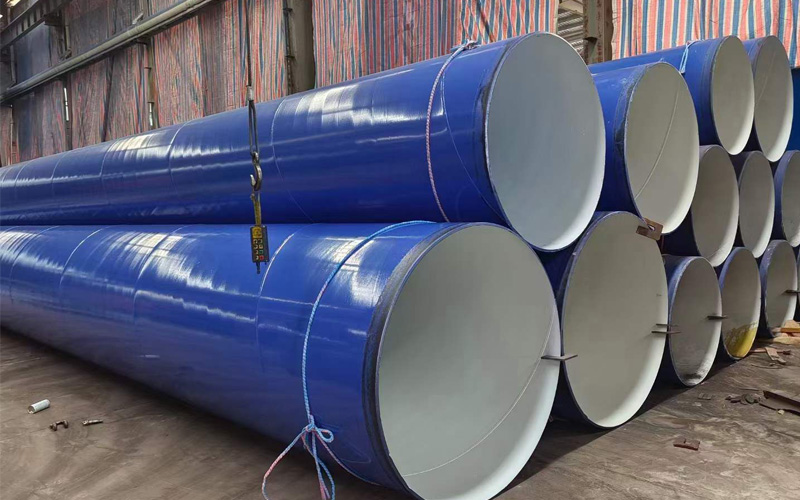FBE Steel Pipe: The Top Choice for Urban Gas Networkss
Urban gas pipeline networks are the “energy lifeline” for residents’ lives and industrial production. Their safe and stable operation is directly related to public safety and social economic order. With the acceleration of urbanization, the length of urban gas pipeline networks in China has exceeded 1.2 million kilometers. Among them, approximately 30% of the pipelines have been in service for over 20 years. Therefore, the anti-corrosion upgrade and quality control of newly built pipelines have become the key focuses of the industry. Among various anti-corrosion technologies, FBE (Fused Epoxy Powder) coating has become the mainstream choice for global urban gas pipeline networks due to its outstanding corrosion resistance and long-term stable reliability, serving as the “first line of defense” for ensuring pipeline safety.
FBE coating: The industry standard choice
The FBE coating is applied by electrostatic spraying technology, which evenly spreads epoxy powder onto the surface of the steel pipe and then cures at high temperature to form a continuous and dense anti-corrosion layer. Its status as a “standard solution” in the natural gas industry stems from three core pillars: technological maturity, regulatory recognition, and practical verification.
At the industry standard level, FBE coating has been incorporated into the core domestic and international standard systems and has become a “mandatory requirement” for gas enterprises’ procurement. The specific standard requirements are as shown in the following table:
| Standard category | Standard number/name | Core requirements |
| Chinese National Standard | Technical Specification for Corrosion Control of Buried Steel Pipelines in Urban Gas Systems CJJ 95-2013 | For newly-built high-pressure gas pipeline networks (with a design pressure of ≥4.0MPa), FBE or FBE composite anti-corrosion coatings should be given priority. The adhesion of the anti-corrosion coating is ≥70MPa |
| Chinese industry standard | SY/T 0315-2013 Technical Standard for Epoxy Powder Anti-corrosion of Buried Steel Pipelines | The thickness range of FBE anti-corrosion coating is specified (standard grade: 300-500μm; enhanced grade: 500-800μm). Salt spray resistance ≥1000 hours |
| International standard | ISO 21809-3 “Oil and gas industry – Pipeline transportation systems – Part 3: Steel pipe coatings | The composition of the FBE coating material (epoxy resin content ≥90%), curing temperature (180-220°C) and impact strength requirements are specified |
| “American standard” | AWWA C210-2018 “Standard Specification for Fusible Epoxy Coatings for Steel Water and Gas Piping” | For gas pipelines, the volume resistivity of the FBE coating should be ≥10¹⁴Ω·cm, and the moisture permeability should be ≤0.5g/(m²·24h). |
Practical application cases show that the FBE anti-corrosion coating has full-scenario applicability in urban gas pipeline networks. Taking the main gas pipeline network in Shanghai as an example, the FBE anti-corrosion steel pipes put into operation in 2010 have maintained an anti-corrosion layer integrity rate of over 98% after 13 years of operation, and the corrosion rate has always remained below 0.001 millimeters per year, far below the upper limit of 0.01 millimeters per year stipulated by the standard.
1. Excellent adhesion to steel: Eliminating the “first crack after coating failure”
The good adhesion between the FBE coating and the steel pipe is the “fundamental prerequisite” for anti-corrosion – if the coating does not bond tightly with the pipe, moisture and corrosive ions will penetrate through the interface, causing “crevice corrosion” and accelerating the damage of the pipe. The FBE coating achieves strong adhesion through the dual effects of “physical anchoring + chemical bonding” : Before spraying, the surface of the steel pipe is treated with Sa2.5 grade sandblasting to form a rough “micro-concave and convex surface”. After melting, the epoxy powder is embedded into these concave and convex surfaces, forming physical anchoring. Meanwhile, the epoxy groups undergo a chemical reaction with the iron ions on the surface of the steel pipe, forming stable chemical bonds and enhancing adhesion.
This strong adhesion can effectively withstand the impact and bending during pipeline transportation and construction. Even during the welding process, the FBE coating can maintain its integrity at a bending Angle of no more than 5°, without cracking or peeling. This ensures complete anti-corrosion of the pipeline throughout its entire life cycle (from the factory to burial).
2. High chemical corrosion resistance: Resisting the “erosion” of complex environments
The underground environment of urban gas pipelines is like a “mixed field of corrosive media” – chloride ions and sulfate ions in the soil can cause electrochemical corrosion, fluctuations in the pH value of groundwater (3.5-9.5) can accelerate the dissolution of pipe walls, and stray currents near subways and high-voltage cables can cause “electrolytic corrosion”. The chemical inertness of the FBE coating enables it to resist these corrosive forces. The ether bonds and hydroxyl groups in its molecular structure can effectively prevent ion penetration. The oxygen transmission rate is as low as 0.1 cm³/(m²·24h·0.1MPa), and the water vapor transmission rate is less than 0.5g/(m²·24h), effectively providing a “water-oxygen barrier protective layer” for steel pipes.
The performance comparison of different coatings under typical corrosive environments (1000-hour test) is shown in the following table, which more intuitively demonstrates the corrosion resistance advantages of FBE coatings:
| Corrosive Environment | Coating Type | Coating Appearance Change | Corrosion Area Percentage of Steel Pipe | Coating Weight Loss (%) |
| 5% Sodium Chloride Solution (Simulated Saline-Alkali Soil) | FBE Coating | No blistering or peelin | ≤0.1% | g≤0.2 |
| 5% Sodium Chloride Solution (Simulated Saline-Alkali Soil) | Polyethylene Coating | Localized blistering (diameter ≤3mm) | ≤5% | ≤1.5 |
| pH=3 Acidic Solution (Simulated Acid Rain Area) | FBE Coating | No discoloration or cracking | 0% | ≤0.15 |
| pH=3 Acidic Solution (Simulated Acid Rain Area) | Asphalt Coating | Softening and localized dissolution | ≤10% | ≤3.0 |
In addition, the FBE anti-corrosion coating has a high volume resistivity of up to 10¹⁴ Ω·cm, effectively blocking stray current from flowing along the surface of the steel pipe. Taking the gas pipeline network of Beijing Subway Line 10 as an example, the FBE anti-corrosion pipeline did not show pitting corrosion after five years of operation, while the adjacent polyethylene tape anti-corrosion pipeline showed pitting corrosion with a depth of 0.3 to 0.5 millimeters. This fully validates the excellent anti-stray current corrosion performance of the FBE anti-corrosion coating.
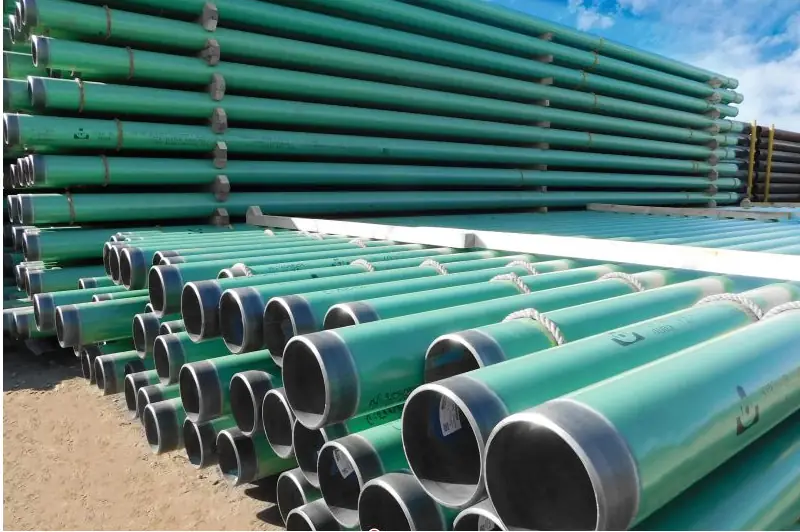
3. Proven long-term Performance: Extending Pipe Life to “Half a century”
The designed service life of urban gas pipeline networks is usually 30 years, and some main pipelines even need to last for 50 years. The FBE coating meets these long-term demands with its “anti-aging, antibacterial and low-maintenance” properties: the ultraviolet absorber and antioxidant have anti-aging performance, and the accelerated aging test (simulating 50 years of environmental exposure) shows that the impact strength retention rate is ≥85%. Its smooth surface and chemical stability can inhibit the growth of microorganisms, such as sulfate-reducing bacteria. Local damage can be repaired on site using a special epoxy repair material with an adhesion of ≥60 MPa. The maintenance cost is only 1/2 to 1/3 of that of polyethylene tape coating, significantly reducing the complexity of pipeline operation and maintenance.
Conclusion – Reliable solutions for critical infrastructure
The safe operation of urban gas pipeline networks is an important part of public safety, and anti-corrosion technology is the “cornerstone” for ensuring pipeline safety. FBE coating, with its excellent adhesion to steel, superior chemical corrosion resistance and proven long-term stability, not only meets the anti-corrosion requirements of gas pipelines in complex underground environments, but also extends the design service life from 30 years to 50 years, providing technical support for the long-term stability of urban energy supply.
From an industry perspective, the continuous expansion of China’s West-East Gas Pipeline Project and the upgrading of urban gas pipelines will drive the sustained growth in demand for FBE coated steel pipes. Its technological maturity, regulatory compliance and cost-effectiveness throughout the entire life cycle make it the preferred solution for new pipeline networks and the upgrading and transformation of old infrastructure.
If your project involves the anti-corrosion design, material selection or construction quality control of urban gas pipelines, we offer comprehensive services, including: (recommended standards based on soil corrosion grades or enhanced coatings), on-site construction guidance (sandblasting for rust removal, control of curing parameters for spray coatings), and post-installation quality inspection (adhesion testing, leakage detection). We tailor comprehensive anti-corrosion solutions based on local soil conditions, design pressure and service life requirements. Welcome to contact us at any time to jointly build a solid “anti-corrosion defense line” for urban gas safety.
Get Your Custom Steel Pipe Quote Today!
Provide us with your project details (like application, specifications, quantity). Our experienced team will respond with a tailored solution and competitive quote within 24 business hours.




